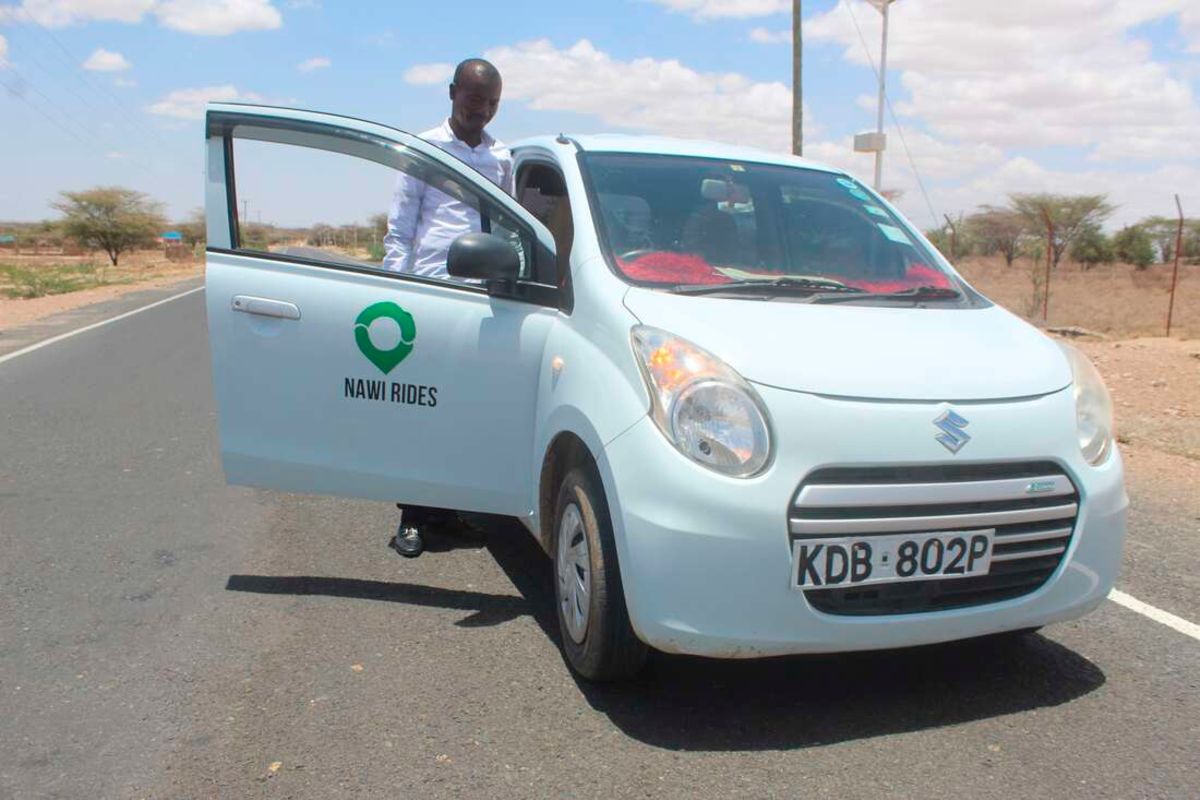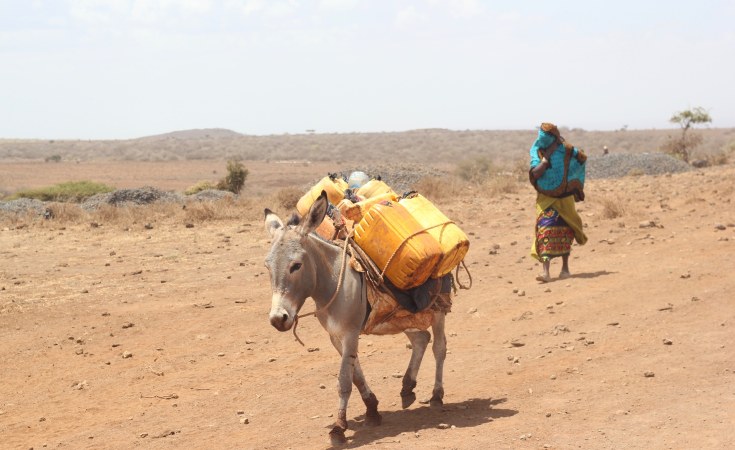MK254
JF-Expert Member
- May 11, 2013
- 31,690
- 48,492
For the longest time, the mention of Turkana would conjured images of poverty, perennial droughts, and insecurity. It was the perception created after decades of starving the vast county of resources necessary to spur development. It was therefore unsurprising that as other regions were producing innovators, Turkana was nowhere on the map .
However, a new start-up is working to drive a different narrative with its digital ride-sharing app and in the process take on established giants like Uber.
Mr Simon Ekai Etom’s light-bulb moment followed disappointing experience with the available transport options. Commuting, he says, was an expensive painful experience that he endured until finally he decided to do something about it and founded Nawi Rides in 2019.
“I experienced firsthand how slow, expensive, insecure and unreliable the local-traditional taxis were. That is why I rolled out Nawi Rides to improve taxi services, ” he tells the Enterprise.
While mulling over his decision to go into the venture, Mr Etom says he was alive to the many odds stacked against him that had stopped many investors from venturing into the area. He, however quickly adds that he was also aware of the enormous potential and hoped that by venturing in the area that has been shunned by established brands his start-up would gain the first mover advantage.
Due to financial challenges he knew from the onset that he had to be smart. Rather than reinvent the wheel by developing his app from the scratch, he says he opted to take the tried and tested route.
“I did research on developing ride hailing app and got developers from India who also have an office in Seattle, United States, “ says the Bachelor of Arts in Public Administration graduate from Egerton University.
“The developers had already made ride hailing apps used in India and South East Asia and so basically what they did is ‘white-label’ their app to suit our needs, that is how Nawi Rides came to be born,” he explains the decision that saw him significantly cut costs.
At the start, Mr Etom says, he injected Sh1 million as capital into the company.
Today Nawi, which is derived from the local ‘Ngaturkana’ dialect, meaning home, is downloadable on both the Google Playstore and Apple Appstore.
Since its launch, Nawi Rides, whose services are primarily offered in Lodwar Town, has recorded significant growth, with over 1,200 customers downloads and was offering 200 rides daily before coronavirus.
This has, however, reduced to an average of 100 during the pandemic.
“Our client’s pockets have dried up due to the general purchasing power loss and prevailing economic conditions as a result of Covid-19 and most nowadays opt to use boda boda as it is the cheaper option,” says the entrepreneur.
To make the platform attractive to both drivers, customers and car owners, Nawi Rides the application also dabbles as a car hiring and rental platform.
This way, customers looking for adventure in the desert can hire any of the off-road vehicles available on its platform.
To sweeten the deal, it has also set competitive commissions. While Uber, Bolt and Little Cab drivers pay a commission of 25 percent, 20 percent and 19 percent respectively, Nawi Rides deducts only 13 percent, meaning drivers and cab owners earn more.
The app charges Sh40 per kilometre, but that is also dependent on other factors such as base fare, time travelled and waiting or congestion charges.
Before drivers are signed up into the app though, they must undergo stringent rules and regulations, which is meant to weed out bad elements in the system.
“We require our drivers to have proper identification, certification and experience and must adhere to our rules of operation,” says Mr Etom.
Nawi Rides drive to greater adoption, has not been without its challenges.
Traditional taxi operators, just like has been the case in other towns in the past, have not taken kindly to the new entrant and have been going out of their way to distupt their operations.
Low adoption of technology among local residents and poor network connectivity are also hindering the ride-sharing business.
“The ride hailing app needs proper network connectivity, our area is sparsely connected.”
For now the firm is not planning to expand its services to highly competitive markets such as Nairobi, Mombasa and Nakuru.
“Our focus is to offer our services to towns within Turkana and neighboring counties such as West Pokot, Marsabit and Samburu,” says Mr Etom.

 www.businessdailyafrica.com
www.businessdailyafrica.com
However, a new start-up is working to drive a different narrative with its digital ride-sharing app and in the process take on established giants like Uber.
Mr Simon Ekai Etom’s light-bulb moment followed disappointing experience with the available transport options. Commuting, he says, was an expensive painful experience that he endured until finally he decided to do something about it and founded Nawi Rides in 2019.
“I experienced firsthand how slow, expensive, insecure and unreliable the local-traditional taxis were. That is why I rolled out Nawi Rides to improve taxi services, ” he tells the Enterprise.
While mulling over his decision to go into the venture, Mr Etom says he was alive to the many odds stacked against him that had stopped many investors from venturing into the area. He, however quickly adds that he was also aware of the enormous potential and hoped that by venturing in the area that has been shunned by established brands his start-up would gain the first mover advantage.
Due to financial challenges he knew from the onset that he had to be smart. Rather than reinvent the wheel by developing his app from the scratch, he says he opted to take the tried and tested route.
“I did research on developing ride hailing app and got developers from India who also have an office in Seattle, United States, “ says the Bachelor of Arts in Public Administration graduate from Egerton University.
“The developers had already made ride hailing apps used in India and South East Asia and so basically what they did is ‘white-label’ their app to suit our needs, that is how Nawi Rides came to be born,” he explains the decision that saw him significantly cut costs.
At the start, Mr Etom says, he injected Sh1 million as capital into the company.
Today Nawi, which is derived from the local ‘Ngaturkana’ dialect, meaning home, is downloadable on both the Google Playstore and Apple Appstore.
Since its launch, Nawi Rides, whose services are primarily offered in Lodwar Town, has recorded significant growth, with over 1,200 customers downloads and was offering 200 rides daily before coronavirus.
This has, however, reduced to an average of 100 during the pandemic.
“Our client’s pockets have dried up due to the general purchasing power loss and prevailing economic conditions as a result of Covid-19 and most nowadays opt to use boda boda as it is the cheaper option,” says the entrepreneur.
To make the platform attractive to both drivers, customers and car owners, Nawi Rides the application also dabbles as a car hiring and rental platform.
This way, customers looking for adventure in the desert can hire any of the off-road vehicles available on its platform.
To sweeten the deal, it has also set competitive commissions. While Uber, Bolt and Little Cab drivers pay a commission of 25 percent, 20 percent and 19 percent respectively, Nawi Rides deducts only 13 percent, meaning drivers and cab owners earn more.
The app charges Sh40 per kilometre, but that is also dependent on other factors such as base fare, time travelled and waiting or congestion charges.
Before drivers are signed up into the app though, they must undergo stringent rules and regulations, which is meant to weed out bad elements in the system.
“We require our drivers to have proper identification, certification and experience and must adhere to our rules of operation,” says Mr Etom.
Nawi Rides drive to greater adoption, has not been without its challenges.
Traditional taxi operators, just like has been the case in other towns in the past, have not taken kindly to the new entrant and have been going out of their way to distupt their operations.
Low adoption of technology among local residents and poor network connectivity are also hindering the ride-sharing business.
“The ride hailing app needs proper network connectivity, our area is sparsely connected.”
For now the firm is not planning to expand its services to highly competitive markets such as Nairobi, Mombasa and Nakuru.
“Our focus is to offer our services to towns within Turkana and neighboring counties such as West Pokot, Marsabit and Samburu,” says Mr Etom.

Turkana start-up Nawi takes on digital taxi hailing giants
Rather than reinvent the wheel by developing his app from the scratch, he says he opted to take the tried and tested route.
